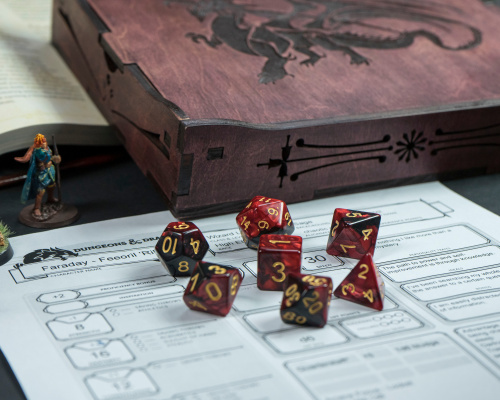It’s Not Just About Dragons: D&D at Work
Date
I’ve always been a nerd. I saw Star Wars in the movie theater during its original 1977 run, and I still own the Monty Python two-volume set of the Flying Circus TV show scripts. Yet despite a lifetime of nerdy pursuits, I carried one major regret: I had never played Dungeons & Dragons. When one of my co-workers graciously offered to “DM”—Dungeon Master, story-teller/referee—a Dungeons & Dragons game for anyone interested, I jumped at the chance!
D&D’s recent resurgence has propelled it back into the zeitgeist. My personal curiosity had been piqued by appearances in Stranger Things and a D&D podcast. As it turned out, a number of other Clarity folks were similarly intrigued. Our group of role-playing neophytes began meeting at lunch every few weeks to learn how to play. Thus was born the Clarity D&D Club.
Besides coming to love the game, I’ve also come to believe in its powers to grow and strengthen a team.
D&D Lesson 1: You Aren’t the Manager Here
As a Senior Engineer at Clarity, I’m often tasked with communicating complicated technical concepts to our clients. As the team manager, I oversee our team’s projects and processes. Yet, as a D&D player, I was now the student, embarking on something complex and unknown.
Taking the role of student was a fun role reversal, and it opened my eyes to opportunities to continue learning in other aspects of my job. I got a chance to practice more listening, to know very little, and observe someone else be the expert. It felt unfamiliar at first, but eventually became a welcome relief. It’s pretty healthy for a manager to take a backseat for a while.
D&D Lesson 2: A Low-Stakes Work Metaphor
The DM of our group was one of the engineers I was helping to take on more onboarding responsibilities. It didn’t take us long to recognize the parallels between the two situations. During D&D, I started to note our struggles and how he helped us navigate them.
Our D&D sessions would come up often during our weekly 1-on-1 meetings, where it served as a fun and useful “sandbox” in which we could apply workplace scenarios of teaching and learning, discussing skills, and reflecting on small successes and failures. Because I wasn’t judging his work performance—and because he was the D&D expert, not me—it was a comfortable, low-stakes way to reflect. Afterwards, we could take these ideas and practice applying them to our work.
D&D Lesson 3: A Masterclass in Freedom vs. Constraint
The great thing about D&D is that when it’s your turn you can do anything. The terrible thing about D&D is that when it’s your turn, you can do anything.
There were several times during a game when we’d get hung up trying to decide our next move. Our DM would often let us flail for a bit or entertain our off-the-wall ideas. “OK—so you’re going to try to make friends with the shadowy, spectral wisp!?”
I asked our DM how he prepared the story when it was impossible to predict what we’d choose to do. He said that over-preparing was the real risk. Some DMs spend so much time preparing one story that they end up railroading the players into following their plan. His approach was to develop a few ideas and lay out some narrative guard rails. We had enough options to be creative, but not so much that the game turned into chaos.
Wow. What a metaphor for software development!
If you’re working with a client or helping someone learn the tools, you need to recommend enough options so that you are providing meaningful choices, but not so many that you induce analysis paralysis and rob them of a true creative option.
D&D Lesson 4: It’s a Story We Write Together
At its core, D&D isn’t a game about dungeons, dragons, spells, weapons, or gold. The real game is storytelling—cooperative storytelling.
A motivated team—working together towards a common goal, combining their skills, and layering one creative idea upon another to build a sum that’s greater than the individual parts—is not only a good scenario for D&D adventuring, but also a pretty great way to build software. None of us joined the Clarity D&D Club to practice the soft skills of collaboration, communication, and problem solving; it’s just another surprising and serendipitous benefit.
As much fun as I’ve had in my six months of playing D&D, it can’t compare with the excitement of a career spent helping build the web. Working with a phenomenal team alongside an engaged client to help realize a project’s full potential is a rich journey of discovery that conjures true magic.

